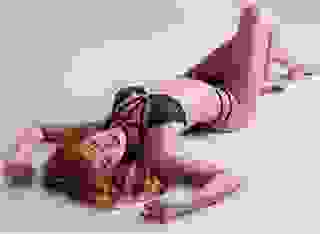- Romance
- One Year After
Note: You can change font size, font face, and turn on dark mode by clicking the "A" icon tab in the Story Info Box.
You can temporarily switch back to a Classic Literotica® experience during our ongoing public Beta testing. Please consider leaving feedback on issues you experience or suggest improvements.
Click hereNo one expected it to happen like it did. Oh, there were some doomsayers who prophesied it, but no one with any sense really believed any human could be so evil. After all, scientists were intelligent men and women in search of the truth, and had a code of ethics that would prevent them from doing such a thing.
What everyone wanted to believe to be mankind's ultimate destruction was either nature rebelling against pollution of the land, air, and water, the eruption of one or more of the several supervolcanoes known to exist, or a deliberate or accidental release of radioactivity and smoke into the atmosphere.
There were other possible causes popularized by various books and films. An asteroid or comet impact seemed to be a favorite for a while after a couple geologists offered the theory the dinosaurs were rendered extinct by just such an impact. Aliens landing in New York Central Park and other major population centers and then setting about either vaporizing the world population or simply using humans as food was another. Even more far-fetched was the conversion of the population into zombies by some virus that appeared because of an error in some government lab.
Randy had dismissed all these as flights of fancy by people with too much time on their hands and a need to achieve their fifteen minutes of world fame. Yes, pollution was a problem, but a problem that the earth could handle given enough time and a lowering of the amounts of pollution released by humans. It had been doing that through numerous huge volcanic eruptions for eons.
Supervolcanoes might indeed erupt, but the risk seemed minimal given the predicted time for the next eruption of the known supervolcanoes varied widely depending upon the predictor and the computer simulation program used.
A deliberate release of radioactivity via a bomb or bombs seemed nearly impossible. No government would be so insane as to actually begin a nuclear war since such an activity would surely cause that country and probably the entire world to suffer the same fate. An accidental release was possible, but the effects of the known accidents had been local for the most part and were caused by humans bypassing or ignoring the normal automated alarms and safeguards in nuclear power plants.
As for the others, asteroids had been monitored and their probable trajectories calculated for years. None seemed to pose an eminent danger to Earth. It was known that NASA and probably their counterparts in the rest of the developed world were working on a way to either destroy or redirect any asteroid posing a danger. As with most information about secret government doings, a leak of the existence of these programs probably meant there were already solutions, though most likely yet untested.
Aliens landing required a bit of extreme thinking. While there statistically enough planets in he solar system and in other solar systems theoretically capable of doing so, any alien visitors would have to come from a great distance. Any practical method of doing so would require traveling at speeds that were in contradiction to the known laws of physics.
To Randy, zombies were a real laugh. The movies were usually fun to watch and sometimes scary, but since Randy had studied biology extensively, it was difficult to rationalize how dead people could become animate and hungry for human brain tissue.
When it did happen, there was no fire and brimstone, no mushroom clouds, and happened over a period of a week instead of being instantaneous. Randy didn't even know it had happened until he walked out of the mountains three weeks later, and that wasn't until he found Marilyn in her small cabin secreted in a hidden valley.
Randy was in the mountains on an extended vacation, and he was alone because he wanted it that way. He'd grown up Challis, Idaho and had been hunting, fishing and camping in the Salmon River Mountains with his father since he was old enough to carry a pack. Those years had schooled him in the ways of wildlife and the forest. Four years in the Army had schooled him in survival and navigating with a map and a compass, so he needed no guide.
After the Army had come college and a degree in wildlife biology. He'd spent the last three years working in the sporting goods store in Challis and waiting for someone in the Idaho Department of Fish and Game to die or retire. In April, that happened, and Randy had finally gotten the job he'd dreamed about since high school. He quit work at the sporting goods store a month before his start date as a wildlife biologist and went back to the mountains to unwind and reacquaint himself with nature.
After spending two days with his parents and preparing his gear, Randy told his father he'd be back in about three weeks, and then walked into the mountains. He walked because motor vehicles were prohibited in the wilderness as well as because he wanted to interrupt nature as little as possible. The wilderness had been established as one of the last truly wild places on Earth and he wanted to respect that.
His pack was not light because he carried what he would need to be relatively comfortable during his stay. A tent would provide shelter, a knife and an axe the means to gather firewood and to dress the fish he planned to catch with his collapsible rod and reel. MRE's and other packaged food would feed him if he was unsuccessful at fishing and foraging. A cooking pot, small frying pan and a few utensils would serve to carry and purify water and to prepare his food.
His sleeping bag would keep him warm on the still-cold nights, and two changes of clothing would let him put on dry, clean clothes while his others were being washed and dried. A couple means of making a fire -- waterproof matches and a ferrocerium rod and striker - would let him stay warm and cook. A map and compass would tell him where he was and show him the way to where he wanted to go.
On his belt, Randy wore a loaded Smith & Wesson.44 magnum revolver. He didn't intend to hunt anything, but the area was home to black bears and probably a few grizzly bears. He'd avoid most contact with bears by taking care to hang his food supply high from a tree away from his camp and by making enough noise while he walked to avoid surprising any bear that might be nearby. The few encounters he did have were a matter of shouting at the black bear and raising his arms to appear larger. The bear had always lumbered away and left him unhurt. Still, there was a danger and he needed to be prepared. In the pack was a box of cartridges for the revolver.
The pack weighed almost eighty pounds. He'd carried such a load several times in the past, and had carried more in the Army. With that much weight on his back, he had to go slowly, but Randy wasn't interested in getting anywhere in particular, much less in getting there fast. He only wanted to relax and enjoy Nature.
[{ }]
Randy thought about these scenarios of Armageddon for the umpteenth time as he walked along the valley floor between two peaks of the mountains. He stopped to look at his map for a while, looked up at the sun, then slipped the straps from his heavy pack. Marilyn did the same and then stretched and smiled at him.
"How far now?"
"Probably a couple of hours, but it'll be dark by then. I think we'll stop here for the night and go into Challis tomorrow. I don't expect anybody will be there, but I want it to be daylight in case there is."
"Good. My legs have taken about all the walking they want today."
He'd found Marilyn in a small cabin back in a thick stand of ponderosa pines on his way back to Challis. It was illegal to build any permanent structure in the wilderness, but no one would have found the cabin except by accident. The small stream that ran beside the cabin was too small to attract fishermen, and the pines would hide the cabin from any view from a plane and disperse any smoke from the stone chimney.
The cabin looked a little run-down, but there was smoke coming from the chimney. Randy walked to the front door to see if anyone was home. If there was, he'd explain why they had to leave and then report them to the Federal authorities once he got back. The wilderness was supposed to stay wild, and any permanent settlement would disrupt the natural flow of life there.
Randy had knocked on the door six times before it opened, and when it did, he found himself looking down the barrel of a 30-30 lever action rifle held by a pretty brunette about thirty or so. She stared at him for a second, then spoke. What she said wasn't what he expected to hear.
"Turn around and leave or I'll shoot you right now."
Randy held out his hands.
"Ma'am, I don't want anything. I just wanted to see if anybody was living here. It's illegal to build a cabin here."
"Where'd you come from? Nobody ever comes up here."
"Well, I wouldn't have either if I hadn't been going back to Challis."
"You walked here from Challis?"
"No, not exactly. I've been camping in the mountains for the last three weeks. I was just on my way back home and decided to walk through this valley because I hadn't been this way before."
"It's been three weeks since you've been in Challis?"
"Yes, three weeks...a couple days longer than that actually."
The brunette lowered the rifle a little.
"Then you don't know, do you?"
"Know what?"
"About the attacks."
"Attacks? What attacks?"
"The attacks on all the big cities. It happened two weeks ago. There aren't many people left alive anywhere now, even in the smaller towns like Challis and Stanley."
Randy's mouth fell open.
"Attacks? That's not possible."
The brunette smiled grimly.
"That's what everybody thought, but I guess they were wrong. I heard it on our radio the first week. It's been dead since then, so I don't know what else has happened."
"You said, "our radio". Does somebody else live here with you?"
The brunette frowned.
"My husband, Joe, went into Challis two weeks ago for supplies, and he hasn't come back. It only takes three days to get there and four days back if you're carrying a full pack. If he was alive, he'd be here by now, so I figure he's dead too."
Randy's mind was reeling at hearing something he couldn't believe. Unconsciously, he sat down in front of the door to try to comprehend what the woman was saying.
"What happened? Everybody is dead? Are you sure?"
"According to the man on the radio, it was a disease -- he said the scientific name, but then he said it was also called glanders -- and it showed up in all the big cities first, but that was a week after they think the first people were infected. They didn't feel really sick for a few days, and kept travelling all over and spreading it. After a week, everybody started to die."
Randy had studied burkholderia mallei, the bacteria that causes glanders, in one of his micro-biology classes and what the woman said didn't make sense.
"It couldn't be glanders. Glanders has been eradicated from the states and most of Europe for decades. The last reported case in the US was in 1945 and that was a government lab technician who got careless. The last actual case was in the late nineteen twenties in the UK. It couldn't be glanders."
The woman frowned.
"All I know is what the man on the radio said, and he said it was glanders. He said some in the government think it was a terrorist group who infected everybody but others think it was just a lab accident here in the US. They're not saying they're sure, or weren't anyway. Like I said before, after I heard that, I kept listening, but there wasn't anything else."
"Well, even if it was glanders, antibiotics can cure it."
The woman shook her head.
"The man on the radio said nothing they tried cured it, and the hospitals had run out of the ones they thought would kill it anyway. Since everybody has it, there's nobody left to make more."
Randy stood, took off his pack and sat back down on the small porch of the cabin. His mind flew through the probable scenario even though he found it hard to believe what he was thinking.
Biological warfare had been used throughout recorded history because it was relatively simple and an easy thing to do. In today's world, it was even simpler and easier.
The US and other countries had experimented with glanders in the late 1940's as a biological agent, but ended the studies because the bacteria seemed to become less infectious when grown in a lab. Two treaties since that time had, in theory, ended research and manufacture of bio-weapons, though a few countries were still suspected of doing both.
Genetic engineering had advanced significantly since the 1940's, and in fact had advanced to the point it was rapidly becoming possible to make a cell do about anything one wanted it to do. Making antibiotic resistant bacteria would be relatively easy. If some country had figured out a way to retain the infectious qualities of the bacteria and improve it's resistance to antibiotics, the world was in trouble. There was no vaccine for the disease. That's why the lab tech had become infected and died.
The bacteria that caused glanders was transmitted by aerosols and other body fluids through inhalation or by skin contact. Given the frequency and ease of travel, even one infected person could infect hundreds before showing symptoms recognizable as something other than flu or some other upper respiratory infection. Those hundreds would each infect other hundreds who would in turn infect more hundreds. After only three such cycles, the infection from one person could easily spread to over a million, and it would all happen in four days at most.
Glanders was still active in the Middle East as well as in Africa and some parts of Asia. It was suspected that more than one or the countries there had significant stores of bio-agents, but it was difficult to prove. Adding glanders to that weaponry would be simple. All that would be required was to obtain a sample, do some gene splicing to improve resistance to antibiotics and maintain virulence, and then deliver it.
Getting the bacteria into the US would not have posed much of a problem. All that would be needed were several individuals who were infected a day before landing in the US. Once there, they would infect others in airports, train stations, and other places where people gathered. Within a week, those first individuals would die unless treated, but terrorists had been blowing themselves up in order to kill other people for years. Succumbing to a disease would be no different to a confirmed terrorist.
The problem with that theory for Ricky was that just like using nuclear weapons, the release of a highly contagious bacteria in one part of the world would soon become a pandemic in every country with any human or animal contact with any other country. The ease and frequency of travel would see to that. Any country that released the bacteria would itself become infected in a matter of weeks if not days. Randy figured it probably came from a lab somewhere, but it was probably an accidental release that got into the population before anyone knew. By the time it was identified, it was too late.
The outcome would be about what the woman had described. A large supply of antibiotics did exist in the hospital system and manufacturer's inventories, but not enough to cope with such a huge infection rate. If the bacteria was indeed engineered to be resistant to antibiotics, the problem would be compounded. Doctors would have little choice but to make patients as comfortable as possible while they watched them die.
It was also likely most of the doctors would also die, because the early symptoms wouldn't be recognized for what they truly were. Doctors would not think to test for the bacteria that causes glanders because the disease was theoretically extinct in most of the world. Hospital personnel would contract the disease before realizing what they were dealing with.
While the man sat there with a dazed look on his face, Marilyn studied him. Joe had always said any person, even a friend, would be a possible threat in a major emergency, but this man didn't seem to be. If anything, he was the opposite. Instead of trying to talk or force his way into her cabin, he'd stayed outside and listened to her. He didn't seem to believe what she was telling him, but he did listen. Joe had never listened to her.
He also wasn't from any government agency, or at least he didn't appear to be. He didn't wear a uniform and he carried a pack like he was camping like he said. Marilyn was nervous about the revolver in the holster at his waist, but he hadn't made any attempt to use it. If he was going to try something, he'd have had the revolver out and ready, and probably shot her when she opened the door.
Should she trust him? Marilyn didn't really know, but she decided to do so. Joe had been gone for two weeks and if the radio was right, he wouldn't be coming back. She didn't miss him so much as she missed having someone with her. After what she'd heard on the radio, Marilyn was scared. Marilyn eased the hammer on the rifle to safe, tucked it in the crook of her arm, and cleared her throat.
"Mister, you're awful quiet."
Randy heard the woman's voice then, and it brought him out of his contemplation of what lay in the future. He looked up and saw the woman had the rifle cradled in her arm instead of pointed at him.
"Yeah, I was just thinking. If what you say is right, this is pretty bad."
"Bad like everybody is probably dead?"
"Almost all the people who were exposed will probably die, but there will be people like you and I who haven't been exposed. As long as they aren't, they'll be fine. You'd have to touch another sick person or animal or at least be very close to one in order to get infected, so as long as they don't, they won't."
"But it'll die out soon, won't it, like the flu always does?"
"Yes and no. Once there aren't any people to infect, the bacteria will die because they can't survive very long outside of a living body. The problem will be the people who somehow survive the disease and there will be some. There always are some people who do during any major disease epidemic, only with glanders, they'll carry the disease and can infect other people as long as they live."
The woman caught her breath.
"So, anybody who's still alive could infect us?"
"That's about the size of it, well, unless they were never infected in the first place."
"So how do we figure out who is which?"
Randy was still pretty shaken, but he didn't miss her use of "we".
"You said 'we'. What did you mean by 'we'?"
The woman looked at the floor.
"Mister, my husband is probably dead and that means I'll have to stay here by myself for God knows how long, probably forever if what you say is true. I wouldn't trust anybody except you right now, so going into Challis or Stanley to find somebody else is out of the question. If I stay with you, I'll feel safer."
Marilyn paused. It would be against everything she'd been taught and believed, but she was a woman and he was a man, and men needed women. If she offered herself to him, this man might stay with her or let her come with him and she'd feel safe again.
She looked up at him and forced herself to smile.
"I can do things for you if you'll let me stay with you. I can cook and make and wash clothes, and...well, there are other things men want."
Randy knew what those "other things" probably were, and knew he could never take her along just for sex. Given the circumstances that now existed, it would be good to have her with him, though. He'd have someone in case he was injured somehow or needed help in some other way. Two people had a better chance of surviving any calamity than one.
Besides, he couldn't just leave her there on her own. As he had told her, there were probably others who were never infected or who had survived the disease. Every disaster, no matter what the cause, seemed to bring out the worst in humans. If she was found here alone, it was likely she'd suffer a fate he wouldn't wish on his worst enemy.








